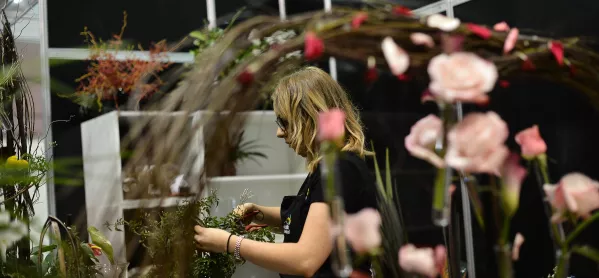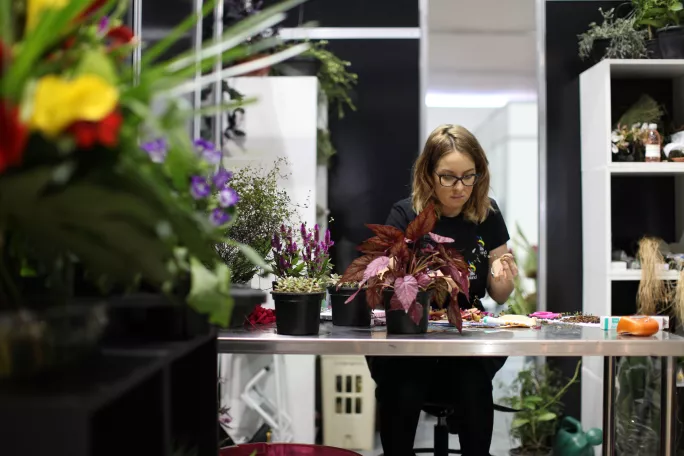
- Home
- ‘Even after WorldSkills, you never stop learning’
‘Even after WorldSkills, you never stop learning’

When talking about their first skills competition, many WorldSkills competitors describe feeling in awe at the size of the arena. Others talk about feeling overwhelmed with anticipation of the task that lay ahead.
But for former competitor Amelia Addis, the thing that struck her the most was the love and passion for vocational skills in her fellow competitors.
“I met so many young people who were really interested in what I was doing. Their skill wasn’t the same skill as mine: plumbers and electricians asking me, ‘What do you have to do for your skill?’
“A lot of my friends weren’t that into their jobs or didn’t really care - I was quite unique in loving what I did. Suddenly, I was in this place where there were all these other people who loved what they did,” she says.
Background: 90% white, 67% male: the WorldSkills diversity crisis
More: Meet the world-class jeweller who just wanted to fly
Expert opinion: ‘Sanction colleges that fail to promote diversity’
Growing up in New Zealand, Addis always loved artistic subjects. But her journey into floristry was sparked by a chance encounter. She was in a floristry shop, buying flowers for a friend, when the manager of the shop started talking about needing a young girl to sweep the floors and wash the buckets.
Starting the WorldSkills journey
“Straight away I said to her, ‘Don’t hire anyone else - I’d really love that job,’” she laughs. She worked at the shop throughout high school and when nothing else piqued her interest as she approached graduation, she decided to carry on working.
“I just kept my job and I realised that it was actually something I was really passionate about. It was about being creative and making something, and also dealing with people and being on my feet. I loved that it was quite a physical job,” she says.
Addis quickly applied for a floristry apprenticeship - something that was quite unusual at the time. She says that most people believed that apprenticeships were only for those who weren’t smart enough to go on to university. But she persevered, and one day received a phone call that would propel her further than university ever could.
“It was a random phone call from the lady who would go on to become my expert. Through my training provider, she knew that I was age-applicable for the [WorldSkills] competition, and asked if I’d like to try it out. I thought, ‘Why not? I’ll give it a go,’” she says.
In her first competition, Addis earned herself a place on Team New Zealand for the 2015 São Paulo WorldSkills competition. But it wasn’t just on her technical ability alone: WorldSkills NZ put its competitors through an interview process in which they were quizzed about their passion for their skill; what support they had in place, both from family and from an employer; and how much time they could dedicate to training. The approach was about much more than talent in a particular skill.

‘It’s such a big task to prepare for’
Addis says that at WorldSkills in São Paulo she experienced “every layer of emotional possible”.
“I felt complete overwhelming joy and excitement but there were times that were really difficult. I found it really really hard competing. It’s so stressful and you’re under a lot of pressure and you can’t rely on anyone but yourself in that moment,” she says.
The international events are extremely intense and can have a detrimental impact on mental health. Addis says that while she thinks she did an “alright job” of coping, she didn’t do enough.
“But that’s representative of everyone, where we are now and how we are talking about mental health. It puts the responsibility on the member organisations to make sure their competitors are training for that as well. We did some training in that, but it’s such a big task to prepare for,” she explains.
“There were times when I broke down after a round and was unhappy with myself and disappointed and that I could have done better and I had done all this training to get here, and that can turn such a hugely positive experience into something negative.
Focusing on competitors’ mental health
‘That’s something all members should be really considering when they are putting these young people into these situations; that they are looking after their mental health to get the best possible growth for the people who are competing,” Addis says.
The competitions taught Addis to rely on herself and have faith in her skills. She says that the experience was pivotal in making her see her job as a career.
After São Paulo she returned to the same florist shop for a while, but struggled transitioning from the high of the competitions to the daily routine of work. She decided that a big change was needed: she relocated to a big city and worked as a high-end wedding event retail florist. Here she gained skills about management and the financial side of running a business.
Along with her partner, Addis moved back to their home town, they bought a small business together, and she put her new skills to the test. He is a mechanic and they now have a thriving workshop as well as a Addis running her own floristry business.
“That was hard, too,” she says. “I wasn’t doing flowers all the time any more. I went to totally identifying this is what I was doing, it’s about that adaptability. All of those skills I learned while being a florist, I can use those in this other business and actually all the things I learned about working with people, and customer service and being able to problem-solve, has really helped our business in the mechanic workshop, in a way that someone else who had gone through a traditional administration path would not be able to apply.”
And being part of the WorldSkills Champions Trust helps her to build her skills set even further.
“I find it really hard to imagine where I’d be if I wasn’t in the Champions Trust,” says Addis. “You have this family of people from all over the word, I’ve become way more understanding of other people, other cultures and also myself.
“From the competitions you would have thought I was already good at that, but even after WorldSkills, you never stop learning. Being in the trust, I’m so much more aware of myself and others and really feel like you can make a big difference - a small group of people can make an impact.”
Register with Tes and you can read five free articles every month, plus you'll have access to our range of award-winning newsletters.
Keep reading for just £4.90 per month
You've reached your limit of free articles this month. Subscribe for £4.90 per month for three months and get:
- Unlimited access to all Tes magazine content
- Exclusive subscriber-only stories
- Award-winning email newsletters
You've reached your limit of free articles this month. Subscribe for £4.90 per month for three months and get:
- Unlimited access to all Tes magazine content
- Exclusive subscriber-only stories
- Award-winning email newsletters



